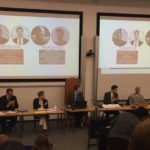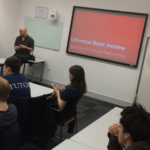
Dr Ross Carroll hosted the first of a series of PPE debates in front of a sizeable audience at the Amory Moot lecture theatre on Tuesday evening. The debate brought together professors from all three disciplines to discuss whether economic growth, previously the standard-bearer of prosperity in a country, was becoming less relevant in modern times.
Philosophy professor Dr Edward Skidelsky opened the debate by proposing that an affluent country’s economic growth has very little influence on the lives of ordinary people. His use of graphical data that demonstrated the rise in economic growth experienced in the UK and an opposite trend for ‘happiness’ experienced by the average individual in their lives made for a compelling argument. Whilst generally favouring the position taken by Skidelsky, Dr Duncan Russell from the politics department took the argument one step further. In his opening address, Russell suggested that the affluent worlds obsession with economic growth and the negative environmental consequences of this has in fact hindered potential economic growth going forward. Russell stressed the need for a strong sustainable economy over the need for growth at any cost, highlighting how this more environmentally-minded approach will in turn allow us to reap the rewards that our natural environment offers.
The final opening address was given by Dr John Maloney, representing the faculty of economics in the debate. Maloney’s ‘to-the-point’ delivery of his opening lines “Is economic growth coming to an end? No. Should economic growth come to an end? No.” arguably made for one of the best quotes of the evening and left the enraptured audience in no doubt over which side of the debate he stood on. Maloney quickly moved to discredit Skidelsky’s argument, pointing to the tenuous nature of ‘happiness’ studies amongst populations, quickly followed by a plethora of statistics that exhibited the importance that economic growth still has in determining the prosperity of a country.
Following the opening statements came questions from the audience and the panellists wasted no time in locking horns over the modern-day importance of economic growth, with Maloney and Skidelsky debating over the effectiveness of trickle-down economics as a result of economic growth. Whilst Skidelsky took the line that the population cared more about relative than real-term income, Maloney argued the opposite, suggesting “People are not willing to be worse off just so richer people will be even more worse off.”
After this lengthy and slightly off-topic dispute, debate mediator Dr Carroll quickly brought the panellists back on-topic, with Russell shifting the conversation back onto the importance of sustainable growth as opposed to sizeable growth. Russell convincingly pointed out the clear links between rising GDP and environmental damaged, crucially reiterating the argument that an optimal level of growth which factors in environmental concerns is key. Whilst agreeing with Russell that it is possible to have sustainable and economically beneficial growth, Maloney alluded to the fact that the majority of people wouldn’t favour a society which stops growth on environmental grounds.
As the debate raged on and questions from the audience kept coming, Skidelsky argued that the correlation between economic growth and many objective indicators, such as education, is particularly weak. Its for this reason, he maintained, that peoples lives aren’t truly improved as a result of economic growth, rendering growth useless in the eyes of many. Although he appreciated how people may feel disconnected from growth figures due to a lack of meaningful impact on their lives, Dr Maloney countered Skidelsky argument by pointing to the links between economic growth and life expectancy for over 90% of the global population.
The final question of the evening focused on the future of economic growth and the role that artificial intelligence had to play in rapidly advancing economies. Skidelsky countered the question by saying that despite concerns of “AI taking human jobs”, its in fact ‘lower-grade’ technology, such as automatic vehicles or cleaning machines that pose a significantly greater threat to peoples jobs and thus overall prosperity. Maloney seconded this point, giving mention to the strong link between unhappiness and unemployment, citing it as a future cause for concern if technological advancements continue rapidly. It was left to Dr Russell to close the debate, detailing how humans have the tendency to invent products, such as AI, without really thinking about the sustainability of their impact. Whilst AI could be beneficial, Dr Russell argued, there are much more pressing issues to deal with, such as our falling level of biodiversity.
All the panellists received a rapturous round of applause from the audience for what was an analytical and entertaining debate. The next PPE debate shall be on Tuesday 14th November with all welcome.



Average Rating